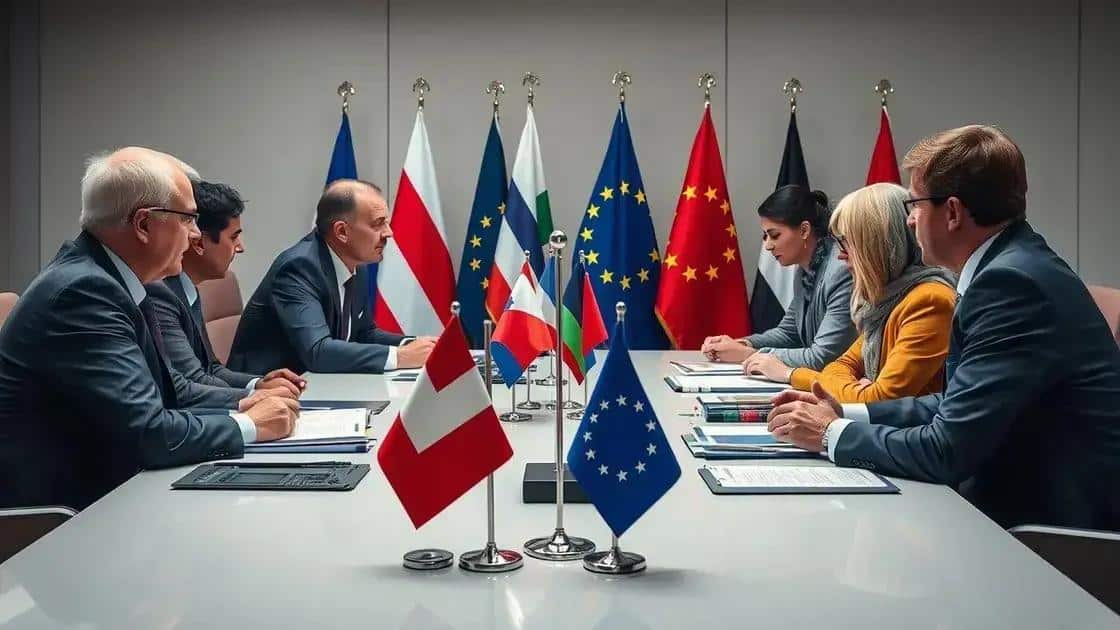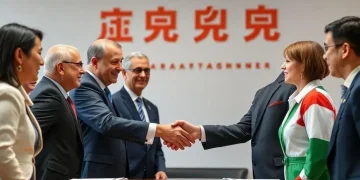Latest trade agreement negotiations with EU bring new insights

The latest trade agreement negotiations with the EU focus on digital trade, sustainability, and improved market access, aiming to enhance economic cooperation and adapt to evolving global trends.
Latest trade agreement negotiations with EU are shaping the future of international business. Have you ever wondered how these agreements affect trade dynamics? Let’s uncover the insights together.
Overview of the latest trade agreement negotiations
The latest trade agreement negotiations are crucial for understanding how countries interact economically. These discussions shape laws and policies that govern trade. It’s essential to grasp the significance of these negotiations.
Key Aspects of Negotiations
Negotiations usually focus on several important factors. One key area is tariffs, which impact how much countries charge each other for goods. Another critical point is trade regulations. These rules ensure fair practices and protect local industries. Understanding these components is vital for businesses.
Benefits of Trade Agreements
Trade agreements provide several advantages.
- Stronger economic ties.
- Access to larger markets.
- Reduced costs for consumers.
As negotiations progress, businesses can prepare to leverage these benefits. The dynamics of these agreements often include a delicate balance of interests among the involved countries. Countries need to negotiate effectively to secure the best terms.
Furthermore, the latest trade agreement negotiations often involve discussions around digital trade rules. This aspect is increasingly important in our technology-driven economy. A focus on digital transactions ensures that all parties can benefit from modern commerce.
Keeping an eye on these developments is essential for anyone involved in trade. As new agreements emerge, they can create opportunities and challenges for businesses worldwide. By understanding the latest trade agreement negotiations, entrepreneurs and companies can adapt their strategies to succeed in a changing landscape.
Key players involved in the negotiations

Understanding the key players involved in the negotiations is essential for grasping the outcome of trade agreements. Each participant brings unique interests and perspectives to the table, influencing the discussions significantly.
Government Officials
At the forefront are government officials who represent their countries. They negotiate terms and frameworks that will govern trade, aiming to protect national interests. These officials work closely with trade ministers and negotiators, ensuring that the agreements align with national objectives.
Industry Representatives
Industry representatives are also crucial in these negotiations. They share insights about their sectors, ensuring that agreements consider the needs of businesses. Their input helps address concerns related to tariffs, regulations, and market access. By including various industries, negotiations can foster balanced outcomes.
- Trade associations advocate for specific sectors.
- Business leaders provide detailed information about market needs.
- Supply chain experts highlight logistical considerations.
As negotiations unfold, the involvement of non-governmental organizations (NGOs) adds another layer of complexity. NGOs often focus on issues like environmental standards and labor rights. Their participation helps ensure that trade agreements uphold ethical practices, addressing broader societal concerns.
Additionally, international organizations play a role in facilitating discussions. Groups like the World Trade Organization (WTO) provide a platform where countries can engage and resolve conflicts. These organizations can help bring together different viewpoints, creating a balanced atmosphere for negotiations.
Understanding the various stakeholders involved helps to clarify the dynamics of negotiations. Each player impacts the discussions uniquely, shaping the final agreements and their implications for global trade.
Potential impacts on businesses in the EU
The potential impacts on businesses in the EU from the latest trade agreement negotiations are significant. These impacts can create new opportunities and challenges for various sectors across Europe. Understanding these effects is crucial for businesses aiming to adapt and thrive.
Market Access
One major impact is improved market access. Businesses may find it easier to export goods and services to other countries. With reduced tariffs and simplified regulations, companies can expand their reach and tap into new markets.
- Increased exports can boost revenue.
- Access to diverse customer bases enhances competition.
- Wider market opportunities encourage innovation.
Additionally, some businesses may face challenges related to increased competition. While new markets can offer growth, they also bring rivals from different countries. Companies will need to enhance their strategies to stay competitive. It’s essential to focus on quality and unique selling points to attract customers.
Supply Chain Adjustments
The negotiations also lead to supply chain adjustments. As tariffs change, companies may rethink their suppliers and logistics. Businesses that rely on imports for materials may face cost fluctuations.
Changes in supply chains can affect production schedules and profit margins. Companies must stay informed about the new regulations and adjust accordingly to avoid disruptions. Monitoring these changes is vital for ongoing success.
Another area to consider is compliance with new trade standards. Businesses need to align with updated regulations that may come from these agreements. This ensures smooth operations and avoids potential penalties.
By understanding the potential impacts on businesses in the EU, companies can create strategic plans to navigate these changes. From market access to supply chain dynamics, every aspect plays a role in shaping the business landscape.
Future trends in trade agreements with the EU

The future trends in trade agreements with the EU are expected to evolve significantly in the coming years. As globalization continues to impact economies worldwide, the EU will likely adapt its strategies to enhance international cooperation.
Digital Trade Agreements
One key trend is the growing focus on digital trade agreements. With technology advancing rapidly, it is essential to address issues like data flow and privacy. These agreements will help facilitate smooth e-commerce interactions and provide standards for digital business practices.
- Regulations on data protection and privacy.
- Frameworks for cross-border data flows.
- Support for e-commerce and online services.
As businesses operate more online, these agreements will be crucial to ensure fair competition and protect consumer rights.
Sustainability in Trade
Another emerging trend is the emphasis on sustainability. Future agreements are likely to include clauses that promote sustainable practices among trading partners. This shift is essential as environmental concerns gain more attention globally.
Companies will need to demonstrate their commitment to sustainability. They may be required to follow stricter guidelines on carbon emissions or to source materials responsibly. As consumers demand greener products, businesses that prioritize sustainability can gain a competitive edge.
Furthermore, trade agreements may incorporate labor standards to ensure fair treatment of workers. Addressing human rights concerns within trade frameworks can lead to a more equitable global trade environment.
As these trends unfold, maintaining transparency and cooperation among nations will be vital. The evolving landscape of trade agreements will shape how countries interact economically, impacting businesses and consumers alike. Paying attention to these future trends in trade agreements with the EU will help stakeholders navigate changes effectively.
FAQ – Frequently Asked Questions about Trade Agreements with the EU
What are the main benefits of the latest trade agreements with the EU?
The latest trade agreements with the EU can provide businesses with reduced tariffs, improved market access, and new opportunities for expansion.
How will digital trade agreements impact my business?
Digital trade agreements will help facilitate e-commerce by setting standards for data flow and online transactions, making it easier to trade across borders.
What role does sustainability play in future trade agreements?
Sustainability is becoming a key focus, as future agreements may include clauses promoting environmentally friendly practices and responsible sourcing.
How can businesses prepare for changes in trade regulations?
Businesses can stay informed about upcoming regulations, adapt their compliance strategies, and engage with industry representatives to address challenges effectively.





